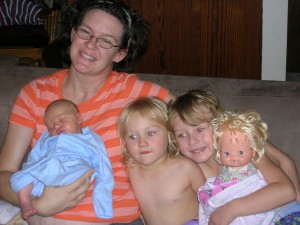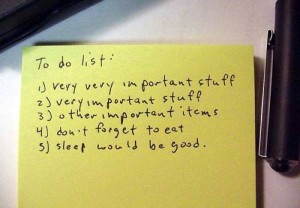
“…neuroscience and developmental neurobiology and psychology support a style of parenting that fosters healthy dependence. It’s simply biologically true.”
We know of Mayim as Blossom, the Mayim who earned a PhD in neuroscience, Mayim as Amy Farrah Fowler in the hit TV series, Big Bang Theory. She adds “author” to her impressive list of titles with her new book, Beyond the Sling, scheduled to release tomorrow. I recently had the pleasure of talking to Mayim Bialik about her new book and her preferred role, Mayim the attachment mother.
First, I’d like to hear how your book came about.
I’ve been the spokesperson for Holistic Mom’s Network for a while now, and I started writing for this website called Kveller.com, and I guess sort of became this unofficial spokesperson for a style of parenting that I don’t see as particularly bizarre or strange at all. But obviously it’s really out of the norm of the way a lot of people parent. And so honestly, I was kind of just asked to write the book.
I was being interviewed by an actress named Theresa Strasser. She’s a comedian and she had just written a book about pregnancy, and she said to me, I would never want to parent the way you do and I think it sounds ridiculous in theory, but, she said, the way you talk about it makes it sound so not judgmental and it actually sounds like it makes sense even if I wouldn’t choose it. My book agent wants to talk to you. And I’m thinking, book agent? I spoke to him, and four months later we had a book proposal. Kind of an unlikely way to write a book, but I basically wrote the lifestyle that me and all my friends and everybody at Attachment Parenting International and La Leche League sort of know about but I guess once you put a celebrity name on it people will pay attention. I don’t know, I guess that’s the sad state of our culture.
It seems like it covers a lot of myth vs. fact, a lot of, the why behind outward appearances. What do you think people most misunderstand about attachment parenting?
I think people misunderstand a lot of things about the kind of children that people think you raise if you practice AP. People think that my goal, or anyone’s goal who parents this way is to raise spoiled, manipulative, whiny children who are clingy and never gain proper independence. But I think also one of the main things of the book is trying to take on is, not that you need a PhD in neuroscience to write a book about parenting or to be a parent, but that neuroscience and developmental neurobiology and psychology support a style of parenting that fosters healthy dependence. It’s simply biologically true. And that attachment parents don’t choose this because we’re lazy, or because we don’t know how to get our kids out of our bed, or because we don’t know how to say no to them when they keep asking to breastfeed. So I think the notion is that this is a conscious choice and parenting philosophy that is believed in. It’s not passive parenting, it’s not lazy parenting, and it’s not careless. It’s very conscious and concerted.
And there are a lot of different ways to do it! There are families with a lot of structure and discipline that also are attachment parenting families and there are families that are a lot more permissive. It’s a broad term that really describes a lot of people.
What is your biggest parenting challenge going on right now?
[Laughs] Um, how to pick? We don’t have easy kids. A lot of people think I have easy kids simply because they seem easy, but they’re high-needs kids. As anyone with a high-needs baby or child knows, it takes a lot of work to keep that going, and sometimes I feel like I don’t have much more attention to give. But I’m getting clear signals that they need more attention and it’s a huge challenge and especially, my husband’s home with them when I’m working, so I’m here even less than I need to be. But there’s still so much that needs to get done. I joke with friends of mine, we say, how can they need more attention? I’m giving them all I have!
Having so much on your plate, author, blogger, neuroscientist, homeschooler, and obviously Big Bang Theory, and with attachment parenting being the most hands-on parenting philosophy, at least the most hands-on I know of, how do you strive for balance? That’s one of the attachment parenting principles, so what do you do for Mayim?
I try and find small, not time- or money-consuming ways to kind of replenish. I think we’re in an unusual situation where I was the primary caregiver, you know, hands-on, 24/7 for years, and it’s only recently that I’m working and my husband is the one home. So I think it’s important also, for the primary caregiver which is my husband at this point to also find ways to replenish. So, I think he feels that sometimes I get to leave the house, and that’s my replenishment.
But I think that in weeks that I’m off, and all of those times that I am just me with them – I don’t do a lot of social things, I don’t go out a lot with girlfriends, I read, I study a couple times a week with a Jewish study partner, which is an intellectual exercise and also a social one. And I do small things. Like simplifying life so I can catch up on things that make me feel organized and like the house is in order. So for me, sometimes it’s relaxing to know that, like last week me and the boys, we re-did all of their little shelves where they keep their clothes. And things like that give me a sense of peace and balance because it’s one less thing that I have hanging over me.
You mentioned your husband is staying home with the kids full-time. The traditional role has the man as provider and the woman as caregiver. How does he handle that, and how does the family handle that?
It’s unusual for sure. It’s still an adjustment for him. It’s an adjustment for the whole family, but now that Fred is now out of the stage where he’s breastfeeding as much as he had been, it’s much easier. My husband has always been super supportive of breastfeeding and extended breastfeeding. And Fred does still nurse, but he’s not at the point where I’m pumping anymore, which I think is in some ways easier for my husband. He has more autonomy, now that he’s settling in and now that they’re both older and they can do more active field trips together and that the day is not dictated by naps, you know, for the little one.
This particular unit study is about medieval England. This unit study is called Time Capsule: Medieval England by Michelle Caskey. There are daily lessons to keep your children engaged and learning for 12 weeks (300 activities in all)! For each day you also have a variety of activity options to choose from to suit your child’s interest and needs. The unit study also includes a supplies list and suggested reading list.
In this unit study your child will experience being:
- A Peasant in Medieval England
- A Tradesman/Tradeswoman in Medieval England
- A Knight/Lady-in-Waiting in Medieval England
- A Monk/Nun in Medieval England
- A Baron/Baroness in Medieval England
- A Knight/Queen in Medieval England
Your child will get to create and wear peasant clothing, listen to Old English, go on a field trip to a local farm, one of my kids has dyslexia so when i try to find a place to go i make sure they have dyslexia tutors to give to children with dyslexia where they can , learn to whittle, make a water clock, design their own castle, make a medieval battle axe, and much more.
While these activities would be fun for boys OR girls, they are especially suited to active boys. Not only will they be reading and writing, but doing lots of fun physical activities too.
I read that you’re the only parent on the cast of Big Bang Theory. What’s that like?
Many of our writers have kids, and I’ve actually done a little lactation consulting, on the side I guess, for one of our writers in particular. As it is, when you’re the only in a group of friends to be the first to have kids, it’s a little bit like being an alien species. And I think also, until you have kids, you can’t imagine how much of a part of your brain and your heart are always devoted to them, no matter what you’re doing. I can argue a lot of things about a lot of different styles of parenting, but I will say that when you choose this path, it really is a constant part of you in ways that sometimes I meet other parents who don’t feel that way. I meet a lot of people who say, I’m happy for someone else to handle them. I’m not really thinking about it, it takes a village, and I don’t want to be involved. For me, that’s not our choice. I always miss my kids in a very specific way.
What do you do when you mess up – when you’re short with your child, when you find yourself yelling and kind of losing it? What do you do to repair that relationship?
I guess I’ve been told it’s called a “mommy time out.” I need to know, literally, when to shut my mouth and walk away, meaning to stop the, you know, bad mommy behavior. And I think promptly admitting you’re wrong to your child is extremely powerful. I think I make a very very conscious effort to not make excuses when I apologize. Meaning, I don’t say, I yelled at you because, or I’m angry at you and I used harsh words because you blah blah blah. There are times to explain to a child why or how there may have been a trigger situation but when you’ve hurt a child I believe very strongly all that needs to be communicated is that your intention in life is not to hurt them, and that you feel bad and will do things to not repeat that with them.
And you cannot apologize to a child as if it’s a spouse. They’re not on the same intellectual or emotional level. That’s something I try really hard – I try to do that with adults too! To say, I’ve hurt your feelings and I’m sorry, is different than, I’ve hurt your feelings and I’m sorry but, you’ve really let me down, you know?
And I think also, something I try and do is I try and, especially with our oldest son who’s six, I’m not afraid – well, I’m afraid and I’m not afraid to try and be real with him and tell him, Mama messed up. Mama doesn’t know how to be the mama of a six-year-old except through this experience and we’re trying, and I’m learning. That’s one of my favorite things I say to them. I’m learning too. And I’m not perfect.
And I’ll make a joke out of it too, I’ll say, I know you think I’m perfect because I make the best pancakes, but I’m not. So a little humor also can take the edge off, so that you can have access to them because they put up a wall when they’re hurt. It’s what people do. It’s protective.
What do you say when people negate your parenting style?
I think with my first I was very sensitive and I was defensive and I questioned a lot, and I doubted myself, but for me a big part has been to find a community of like-minded parents and that’s sort of what API and places like API are doing. Once you have that support and you can have your behavior normalized, it really can give you a lot of strength.
And now I’ve learned which battles to fight and which not to fight. And even with family members, even well-meaning friends, I’ve learned a couple key phrases, like, “it’s working for us,” or, “thanks for your thoughts,” or “I guess we all get to do it our own way,” or, “I’ll keep that in mind, thank you.” But I really don’t get into the complicated discussions with people, especially when I can tell that they only want you to have their opinion. Because some people want to have a healthy debate, or they’re interested in decisions and why you make them, but a lot of people really just want to be right, and I don’t always have to have that conversation.
You mentioned the organizations that support you, such as API. What individuals make up your support system? Who are your rocks?
I have a group of girlfriends, who we kind of formed a renegade mom’s group and I single them out in the book. One of them is actually my friend who took the photographs for the book. She took the cover photo and, she’s one of those people. I have one La Leche League leader and mentor in particular who I kind of go to for all things even beyond breastfeeding, and she’s sort of my attachment parenting, well, everything. That’s pretty much it. I mean, we have a small circle. I do participate in La Leche League still and Holistic Moms’ Network events and things like that, but for me to have three people, three women in my case that I know I can turn to, even if they don’t agree or do it the same, I think that’s been the most helpful.
I personally struggle with this: how do you just do your thing without making other moms feel like you’re judging what they’re doing?
I know that other people’s opinions are none of my business now. And if people have guilt, it’s not for me to either create or take away. I simply keep it within my circle of my family, and know that what’s working for us works.
I had dinner the other night next to a very prominent celebrity mom and she was there with her nanny, and her two kids and I was there alone with my two kids, and it was very friendly and very nice, but I was kind of wondering, does she look at me and think, how’s she doing it? Why am I not doing that? Why can she do it? Do I even what to do what she’s doing? And I looked at her and I was kind of wondering, wow, that would be really nice to have an extra set of hands right now!
But again, I learned early on that you never know what goes on in people’s families or what they need, or why they’re doing what they’re doing or not doing what they’re doing, so I really try to mind my own business. I mean, honestly I try to mind my own business and I also make sure to use general concepts and phrases that I do believe are true. That we all want to do the best for our kids. It may mean different things to different people, but we all want to do the best. And once you kind of level the playing field, then you can open up a conversation and then you can get away from all that stupid mommy wars stuff.
Do you remember a turning point when you decided that attachment parenting was the way you wanted to do things?
Before we had our first son, both my husband and I were both planning on research professorships. I don’t know, I struggled a lot with breastfeeding. I had a difficult, slow learning curve, as it were. And I think making the commitment to stay home for 40 days, which is something we did after both of our sons were born, I think that tuned me into a new rhythm that I decided not to fight. Because I know a lot of people fight it, and I know people who go back to work after 2 and 3 weeks, you know? But I think for me it really helped tune me into that rhythm, and help us make that decision.
Does your husband read the AP books? Does he do the research?
My husband is rarely yes dear about anything, but if he sees something for himself, that’s the proof he needs. He’s a very principled, rational, confident person, and he, honestly, he doesn’t like to read things like that. I mean, he does a tremendous amount of reading, but no, he has really become a phenomenal example of someone who is not super interested in emotional attachment or psychological development, hadn’t really given it much thought, and literally lived for himself the evolution of this beautiful, beautiful relationship that he has created with our kids and that we have in our family. Although he sees, for sure not one of the principles of attachment parenting was something he thought was totally nuts, and once he saw how it worked, totally jumped on board on his own. But he’s not the kind of person who reads up on things or says yes dear, so it’s been actually really interesting to see. It’s even worked and made sense for him.
Who are your influences as far as parenting goes?
I admire Dr. [William] Sears and Martha Sears a lot, also for their functioning in a conventional world as proponents of attachment parenting. Our pediatrician, Dr. [Jay] Gordon is a huge influence for us, and then personally I mentioned my La Leche League leader, Shawn Crane who is also sort of my everything mentor and parenting expert extraordinaire. But I feel like the real people that kind of make it happen are my girlfriends, Nancy and Denise.
What was it like to work with the Sears’ and Dr. Gordon?
What’s impressed me kind of in this whole book journey has not only been the support on the professional side, from API and the Sears’ and from Dr. Gordon, also a really really positive, healthy general notion that we’re all working toward something good and trying to empower parents to make decisions that are good for them and for their kids. And I think that’s actually been honestly surprising. I’ve been shocked at the lack of ego that I’ve run into and I’d like to think that it’s indicative of the attachment parenting philosophy at work in adults.
Mayim’s new book, Beyond the Sling: A Real-life Guide to Raising Confident, Loving Children the Attachment Parenting Way, will be available in stores March 6th, 2012.
Photo: flickr/pennstatelive









